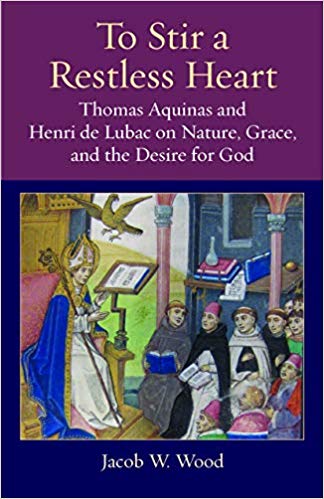
|
To Stir a Restless Heart: Thomas Aquinas and Henri de Lubac on Nature, Grace, and the Desire for God By Jacob W. Wood The Catholic University of America Press (August 22, 2019).
To Stir a Restless Heart tells for the first time the story of how Thomas Aquinas conversed with his contemporaries about the dynamics of human nature's longing for God, and documents how he deliberately utilized Greek, Arabic, Hebrew, and Latin sources to develop a version of Aristotelian natural desire that was uniquely Augustinian: natural desire seeks the complete fulfillment of human nature "insofar as is possible," and so comes to rest in the highest end that God offers to it. Depending on whether God offers the free gift of grace to humanity, one and the same natural desire can come to rest in knowing God through creatures or seeing God directly.
Tracing the reception of Aquinas in the centuries that follow, Jacob Wood argues that Aquinas's student from among the Augustinian Hermits, Giles of Rome, consciously transformed Aquinas's understanding of human nature. By insisting that every nature has a positive aptitude for one, specific end, Giles tied our natural desire positively and directly to the vision of God, setting up a 700-year challenge among the Augustinian Hermits to explain the integrity of a nature with a supernatural end, as well as the gratuity of the grace which perfects it. Showing how de Lubac's early discovery of that tradition served as a principal source for his "natural desire for a supernatural end," To Stir a Restless Heart argues that many recent criticisms of de Lubac's theological anthropology find ready answers among the Augustinian Hermits, but that a renewed understanding of Aquinas's Augustinianism offers a more complete way forward: it preserves Aristotle's commitment to the integrity of human nature, de Lubac's commitment to the transcendence of human perfection, and Augustine's insistence on the priority and gratuity of divine grace in the work of redemption. |
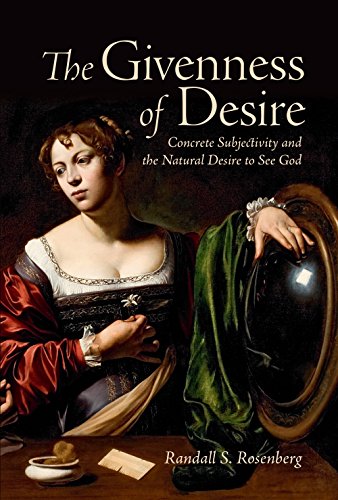
|
The Givenness of Desire: Concrete Subjectivity and the Natural Desire to See God By Randall S. Rosenberg. University of Toronto Press, Scholarly Publishing Division; 1 edition (June 7, 2017).
In The Givenness of Desire, Randall S. Rosenberg examines the human desire for God through the lens of Lonergan’s "concrete subjectivity." Rosenberg engages and integrates two major scholarly developments: the tension between Neo-Thomists and scholars of Henri de Lubac over our natural desire to see God and the theological appropriation of the mimetic theory of René Girard, with an emphasis on the saints as models of desire. With Lonergan as an integrating thread, the author engages a variety of thinkers, including Hans Urs von Balthasar, Jean-Luc Marion, René Girard, James Alison, Lawrence Feingold, and John Milbank, among others. The theme of concrete subjectivity helps to resist the tendency of equating too easily the natural desire for being with the natural desire for God without at the same time acknowledging the widespread distortion of desire found in the consumer culture that infects contemporary life. The Givenness of Desire investigates our paradoxical desire for God that is rooted in both the natural and supernatural.
|
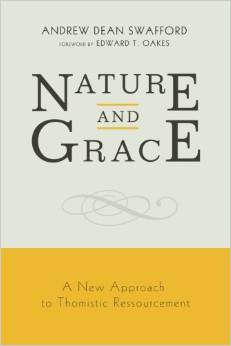
|
Nature and Grace: A New Approach to Thomistic Ressourcement By Andrew Dean Swafford; forward by Edward T. Oakes, SJ. Pickwick Publications (June 25, 2014).
Conventional wisdom has it that thinking on nature and grace among Catholic intellectuals was severely clouded by the work of Cajetan and his fellow Thomistic commentators from about the sixteenth century to the eve of Vatican II. Henri de Lubac has rightly been given credit for pointing this out; and to all appearances, de Lubac's influence won the day, as can be seen by the imprint of his thought upon not just the Second Vatican Council, but also the pontificates of John Paul II and Benedict XVI.
However, in recent years, a new crop of Thomistic scholars has arisen who question whether de Lubac's word on nature and grace should be the last; hence, the debate over the nature-grace relation, so heated at mid-twentieth century, has been stirred once again. Dr. Swafford here offers a "third way" by way of the nineteenth-century German theologian Matthias J. Scheeben who, for some reason, has never really been considered especially relevant to this debate. Swafford shows that Scheeben can capture the very best of both sides, while at the same time avoiding the characteristic pitfalls so often alleged against each. |
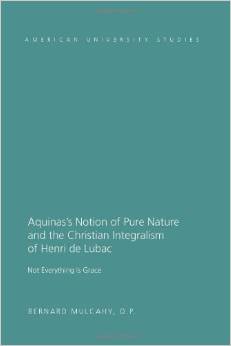
|
Aquinas's Notion of Pure Nature and the Christian Integralism of Henry de Lubac (American University Studies. Series VII. Theology and Religion) By Bernard O.P. Mulcahy Peter Lang International Academic Publishers (April 14, 2011)
Henri de Lubac argues that, in early modern times, a pernicious concept began to become commonplace in Roman Catholic theology: this concept is “pure nature.” Pure nature is human nature, considered without reference to grace or to the supernatural destiny of personal union with God. Further, de Lubac argues that Catholic theology, in assimilating this idea, has departed from the sound tradition represented by St Augustine and St Thomas Aquinas. He holds that the notion of pure nature leads inevitably to the self-exclusion of Christianity from the affairs of the world -- when, in fact, the light of the Gospel ought to be shed on all aspects of human existence.
This dissertation tests de Lubac’s thesis concerning the history of the idea of pure nature, showing that this notion is not, in fact, a modern novelty. This study examines the role of the idea of pure nature in the Bible and early Church, in the theology of Thomas Aquinas, in the early modern Jansenist controversy, in the theology of Henri de Lubac, and in the theology of the contemporary Radical Orthodoxy movement, paying particular attention to the historical circumstances which made the repudiation of “pure nature” attractive. Today, some theologians follow de Lubac in contending that Catholic doctrine must eschew the idea of pure nature in order to resist secularism and maintain Christianity’s relevance to all aspects of human life. This dissertation contends that the idea of pure nature is not only traditional, but necessary for Christian theology. It argues that a Christian “integralism” which refuses to prescind from grace when considering nature can do justice neither to nature nor to grace. Reviews
|
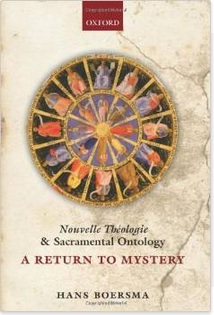
|
Nouvelle Theologie and Sacramental Ontology: A Return to Mystery
Hans Boersma Oxford University Press; Reprint edition (January 15, 2013).
Publisher's Description: An in-depth study of nouvelle theologie and the ressourcement movement. Hans Boersma argues that a return to mystery was the movement's deepest motivation. He sets out the context for the early development of the movement prior to Vatican Ii and provides detailed analysis of its characteristic elements and thinkers.
NOTE: Hans Boersma provides a general (sympathetic) survey of the nouvelle theologie movement and its major proponents. I've chosen to include it here with attention to Chapter 3: "The Mystery of the Human Spirit: De Lubac and Bouillard on Nature and the Supernatural" and its explication of De Lubac's perspective (pp. 88-99). - Christopher |
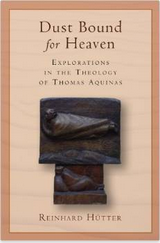
|
Dust Bound for Heaven: Explorations in the Theology of Thomas Aquinas by Reinhard Hütter. Wm. B. Eerdmans Publishing Company (October 1, 2012).
In Dust Bound for Heaven Reinhard Hütter shows how Thomas Aquinas's view of the human being as dust bound for heaven weaves together elements of two questions without fusion or reduction. Does humanity still have an insatiable thirst for God that sends each person on an irrepressible religious quest that only the vision of God can quench? Or must the human being, living after the fall, become a "new creation" in order to be readied for heaven?
Hütter also applies Thomas's anthropology to a host of pressing contemporary concerns, including the modern crisis of faith and reason, political theology, the relationship between divine grace and human freedom, and many more. The concluding chapter explores the Christological center of Thomas's theology. |
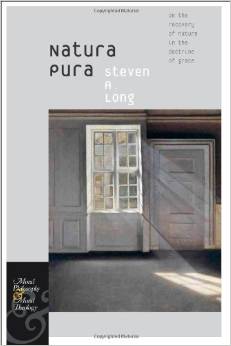
|
Natura Pura: On the Recovery of Nature in the Doctrine of Grace (Moral Philosophy and Moral Theology) by Steven Long. Fordham University Press; 1 edition (April 28, 2010).
From speculative theology to the exegesis of Aquinas, to contemporary North American philosophy and Catholic social and ethical thought, to the thought of Benedict XVI, this work argues the crucial importance of the proportionate natural end within the context of grace and supernatural beatitude. Long argues that, in the effort to avoid naturalism, Henri de Lubac unwittingly consummated the loss of nature as a normative principle within theology, both doctrinally and exegetically with respect to the teaching of Aquinas. The author argues that this constitutes an understandable but grave error. De Lubac's view of the matter was adopted and extended by Hans Urs von Balthasar in The Theology of Karl Barth, in which Balthasar argues that Aquinas could not even consider pure nature because it was impossible for him even to make the conceptual distinction implied by this problem,a view contradicted by Aquinas's text. Long argues that in The Theology of Karl Barth, Balthasar's account evacuates nature of its specific ontological density and treats it as mere createdness as such,a kind of dimensionless point terminating the line of grace. Given the loss of natura within theological method, its recovery requires philosophic instrumentalities. In its third chapter this book argues that by reason of its lack of any unified philosophy of nature or metaphysics, the analytic thought so widespread in Anglophone circles is merely a partial metaphilosophy and so cannot replace the role of classical Thomism within theology. The fourth chapter argues against those who construe affirmation of a proportionate natural end as equivalent to social Pelagianism or minimalism in the public square, engaging the work of Jacques Maritain, Jean Porter, and David Schindler, Sr. In an appendix, the author examines the early thought of Cardinal Ratzinger / Pope Benedict XVI, and its development toward the Regensburg Lecture.
Reviews
|
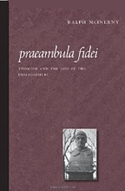
|
Praeambula Fidei: Thomism and the God of the Philosophers By Ralph MacInerny. Catholic University of America Press (April 20, 2007).
"The Praeambula Fidei" ("preambles of faith") are regarded by Thomas Aquinas as the culmination of philosophy: natural theology, the highest knowledge of God that is possible on philosophical grounds alone. The natural home for such considerations is the "Metaphysics" of Aristotle and Thomas's commentary on that work. Yet Thomas's view has been cast into doubt, with philosophers and theologians alike attempting to drive a wedge between Aquinas and Aristotle. In this book, renowned philosopher Ralph McInerny sets out to review what Thomas meant by the phrase and to defend a robust understanding of Thomas's teaching on the subject. After setting forth different attitudes toward proofs of God's existence and outlining the difference between belief and knowledge, McInerny examines the texts in which Thomas uses and explains the phrase "preambles of faith." He then turns his attention to the work of eminent twentieth-century Thomists and chronicles their abandonment of the preambles. He draws a contrast between this form of Thomism and that of the classical Dominican commentators, notably Cajetan, arguing that part of the abandonment of the notion of the preambles as philosophical involves a misreading and misrepresentation of Cajetan. McInerny concludes with a positive rereading of Aristotle's "Metaphysics" and Aquinas's use thereof. In the end, the book argues for a return to the notion of Aristotelico - Thomism - Thomistic philosophy as the organic development of the thought of Aristotle.
Reviews
|
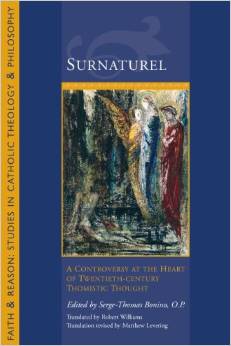
|
Surnaturel: A Controversy at the Heart of Twentieth-Century Thomistic Thought (Faith and Reason: Studies in Catholic Theology and Philosophy) By Serge-Thomas Bonino. The Catholic University of America Press (July 1, 2007). In 2000, the Dominicans of the Toulouse Province of France sponsored a symposium in which several scholars, both lay and clerical, criticized de Lubac from numerous angles. This book contains the contributions of scholars from the Toulouse conference. In the first section, Etienne Fouilloux describes the arc of Henri de Lubac's career up to the publication of his Surnaturel; Georges Chantraine, S.J., describes de Lubac's Surnaturel; Henry Donneaud, O.P., describes the early Thomistic response to the book; and Rene Mougel depicts Jacques Maritain's position on the topic. In the second section, focusing on Thomas Aquinas and the medieval period, Michel Bastit inquires into the relationship of Thomism to Aristotle; Jean-Miguel Garrigues explores the grace of Christ; Serge-Thomas Bonino, O.P., describes the variety of medieval positions on nature and grace as seen in theological accounts of limbo; and Jean-Pierre Torrell, O.P., masterfully summarizes nature and grace according to Aquinas. The third section engages late-scholastic developments: Laurence Renault treats William of Ockham; Jacob Schmutz explores the shifting expositions of concurrence (divine and human causality) between the thirteenth and the seventeenth centuries; and Marie-Bruno Borde, O.C.D., presents the position of the Salmanticenses. Lastly, section four inquires into contemporary developments: Georges Cardinal Cottier, O.P., discusses natural mysticism and the theology of the religions; Gilbert Narcisse, O.P., traces the theme of grace in contemporary theology; Benoit-Dominique de La Soujeole, O.P., explores the situation of contemporary ecclesiology; and Bishop Andre-Mutien Leonard notes the value of the concept of; pure nature; within theological discussions.
Reviews
|
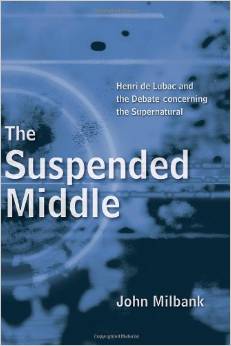
|
The Suspended Middle: Henri de Lubac and the Debate Concerning the Supernatural By John Milbank. Wm. B. Eerdmans Publishing Company (September 21, 2005).
French Jesuit Henri de Lubac (1896–1991) was arguably the most revolutionary theologian of the twentieth century. He proposed that Western theology since the early modern period had lost sight of the key to integrating faith and reason — the truth that all human beings are naturally oriented toward the supernatural.
In this vital book John Milbank defends de Lubac’s claim and pushes it to a more radical extreme. The Suspended Middle shows how such a claim entails a ‘non-ontology’ suspended between rational philosophy and revealed theology, interweaving the two while denying them any pure autonomy from each other. As de Lubac’s writings on the supernatural implicitly dismantled the reigning Catholic (and perhaps Protestant) assumptions about Christian intellectual reflection, he met with opposition and even papal censure. Milbank’s sophisticated account of de Lubac delineates the French theologian’s relations with other proponents of the nouvelle theologie, such as Hans Urs von Balthasar, and clarifies the subtle but crucial divisions within recent Roman Catholic theology. The most substantial treatment in English of de Lubac’s as yet untranslated Surnaturel and the subsequent debate, Milbank’s Suspended Middle lays down an energetic challenge that every serious student of theology and Christian philosophy will want to engage. Reviews
Discussions
|
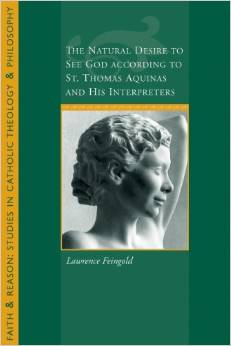
|
The Natural Desire to See God According to St. Thomas and His Interpreters (Faith and Reason: Studies in Catholic Theology and Philosophy) By Lawrence Feingold. The Catholic University of America Press; 2 edition (October 1, 2004) What kind of natural desire is this? How can there be a natural desire for what can only be supernaturally obtained? How can such a desire be reconciled with the gratuitousness of grace and glory? What are its implications for apologetics? These and similar questions have caused a debate to rage for centuries over the proper interpretation of the natural desire to see God. This work seeks to determine the nature of this desire and its relationship with the supernatural order through an examination of the thought of St. Thomas and some of his most prominent interpreters, including Scotus, Cajetan, Suárez, and Henri de Lubac.
About the Author: Lawrence Feingold converted to Catholicism in 1989 together with his wife, while engaged in realist marble sculpture in Pietrasanta, Italy. He studied Philosophy and Theology at the Pontifical University of the Holy Cross in Rome from 1990 to 1999, earning a doctorate in Dogmatic Theology. He is currently an Assistant Professor of Theology in the Institute for Pastoral Theology of Ave Maria University. Reviews / Discussion
|
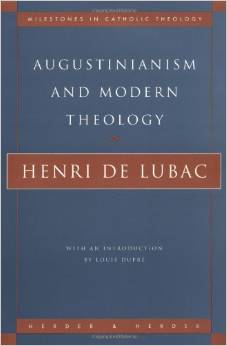
|
Augustinianism and Modern Theology (Milestones in Catholic Theology) By Henri de Lubac. The Crossroad Publishing Company (May 1, 2000).
This companion volume to The Mystery of the Supernatural focuses on the idea of pure nature and its origins in nominalist readings of Augustine.
|
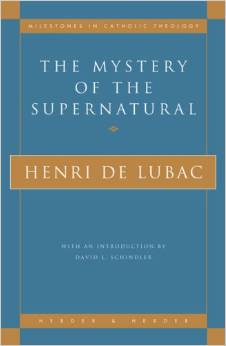
|
The Mystery of the Supernatural (Milestones in Catholic Theology) By Henri de Lubac. The Crossroad Publishing Company (May 1, 1998).
First published in 1965, this book represents a refinement and further development of the core thesis that Henri de Lubac had originally put forward many years earlier in a bold and controversial work in which he first called into question the idea of pure nature.
|
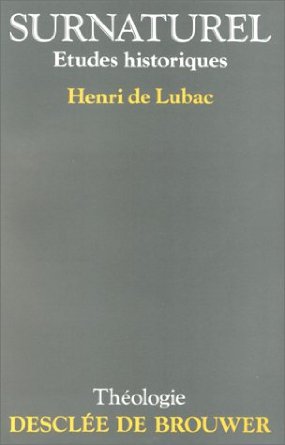
|
Surnaturel : Études historiques
|
Relevant Readings
Subscribe to:
Comments (Atom)
